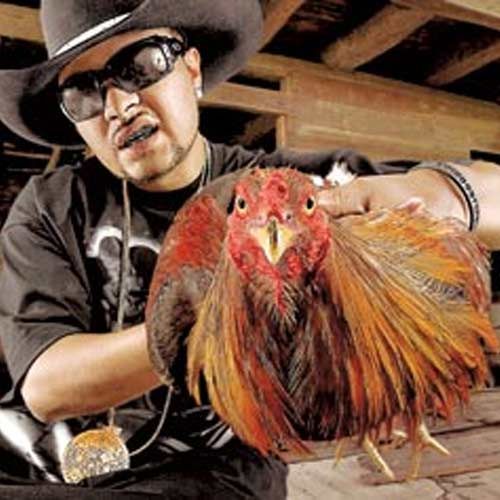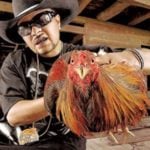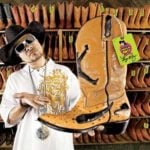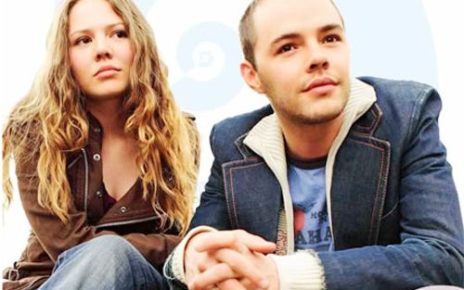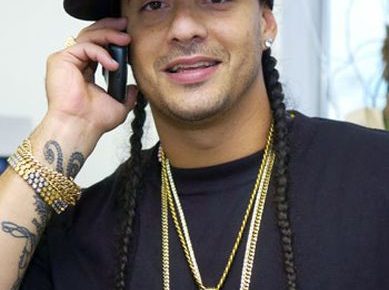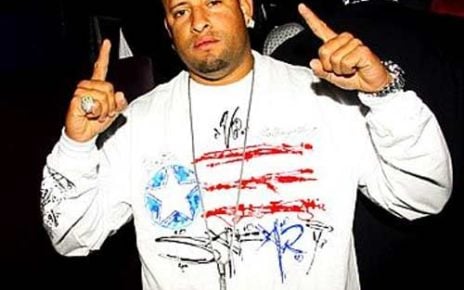| Real Name : | Pedro Herrera III | |
| Nickname : | The Tamale Kingpin | |
| Born : | N/A | |
| Birth Place : | Houston, Texas, United States |
As one Texas’ premier underground rappers/entrepreneurs, Chingo Bling has achieved a level of independent success that only a few in his generation have accomplished. Dubbed the Latin Russell Simmons because of his ability to skillfully parley himself into a remarkably successful brand, selling thousands of CDs, bobble-head dolls, coloring books, DVDs, t-shirts, hot sauce and tamales.
“I always looked up to Master P, J. Prince, Tony Draper, Puffy and Russell Simmons,” says Chingo. “All of them built strong brands so it just made sense to me that I had to build my brand like that. If I was gonna name myself as an artist and name my CD then I had to brand it. I had to name my label and make it the biggest thing going.”
Chingo Bling was born Pedro Herrera III in Houston to Mexican American emigrants who came to the United States with dreams of achieving the American dream for themselves and their children.
His father set the example by working several jobs to ensure that his family had all they needed. He even worked a side gig selling tamales made by Chingo’s mother to his fellow workers at lunch time. Like many emigrant families, times were tough but the Herrera family made do. “ We always lived real simple,” recalls Chingo. “We just had everything we needed and we were happy. We had the basics: beans, rice . . . the staples. We were happy with the simple things in life.”
Another one of the simple things in Chingo’s life was music. His parents played a little bit of everything, especially Spanish versions of classic 50 rock. When Chingo was ten, his father traded his box of expensive tools to a fellow worker who was a professional musician on the weekend in exchange for a used keyboard. It was a gift bestowed on Chingo that would later have a profound impact on his life. “ I would just listen to the different Spanish music that would play at the house and play along, tying to find the melody. Eventually [somebody] broke in the house and one of the things that they took was that little keyboard.”
Aside from Spanish music, Chingo was also exposed to rap music via his two older sisters. Thanks to them, he heard acts like the Beastie Boys, Public Enemy, Slick Rick, LL Cool J, Uncle Luke, Cypress Hill, and other groups that would later influence him as a rapper. He also paid close attention to the people behind the artists like J. Prince, the founder and CEO of Rap-A-Lot, Sean “P. Diddy” Combs founder and CEO of Bad Boy Entertainment and Sean Jean Clothing, Tony Draper founder and CEO of Suave House Records and Russell Simmons founder of Def Jam Recordings & Phat Farm Clothings, all of whom would serve as the inspiration for his future endeavors as a entertainment entrepreneur.
Upon graduation from high school, Chingo enrolled in Trinity University in San Antonio, Texas, majoring in Business Administration and Marketing. It was there at a frat party that Chingo made his first foray into the music business as a DJ.
“ It was a typical frat party,” recalls Chingo. “People just walking around drinking but there was no music. So I told the frat dudes, man I got some CDs in my car if you want I can play some stuff right here in the living room. I started spinning, just playing and switching out CDs and just playing different stuff, crunk mixes from different mix tapes and songs that wasn’t out yet and getting the little flows together. The next thing you know people were coming into the living room and dancing.”
From there, Chingo, his college roommate and a mutual friend formed a DJ crew that spun at parties around campus and soon became the toast of San Antonio’s party scene. Their popularity landed a Sunday evening mix show on the college radio station, 91.7 KRTU. His affiliation with the mix show gave him instant access to San Antonio’s hottest underground rappers who would invite Chingo into their studio for recording sessions. Chingo would serve as an unofficial A&R to many of these local artists, offering feedback and criticism on their music as well as cracking jokes and doing funny little skits to keep the atmosphere light. His jokes and skits were so good, many San Antonio rappers would invite him to record his comedic monologues for their albums.
“I would just start rapping, saying silly shit while they were rapping,” says Chingo. “And they were like hey, why don’t you do one for my album. I would also put little freestyles and some funny skits on my mix tapes and they started selling good.”
In 2002, Chingo Bling formed Big Chile Records and released his first mix tape as a solo artist called Duro en la Pintura, which means Hard in the Paint. The tape became an underground success, selling thousands of units and still considered a cult classic by fans of Texas rap. Chingo continued to expand his fan base by releasing a series of all flows mix tape that ultimately created the buzz for his independently released debut LP The Tamale Kingpin. Released in the year 2005, The Tamale Kingpin sold a whopping 10,000 units within the first few weeks. Unfortunately, the momentum of the record was marred because it had to be pulled due to his distributor ’s unscrupulous payment practices. But Chingo remained undaunted and continued to drop mix tapes. Big Chile Records expanded its merchandising to include t-shirts, DVDs and bobble-head dolls. It even sold children’s coloring books, hot sauce and tamales.
By 2006, Houston had become one of the major hubs for hip hop and Chingo Bling was in the forefront of it all. He was featured twice on MTV, once on MTV’s My Block segment and on MTV News.
His incredible independent buzz led to an unprecedented deal with Warner/Asylum.
In May of 2007, Chingo Bling released his national debut They Can’t Deport Us All to rave reviews and much controversy. The album dealt with issues affecting Mexican emigrants and thrust Chingo Bling into the national spotlight as an advocate for social justice.
“I understand that it is a touchy subject and there’s different points of views but more than anything I believe that what I was trying to put out there was just respect the emigrant a little bit more. It was very satisfying ’cause the message behind [They Can’t Deport Us All] means so much to me. And to be able to have marketing dollars to push a concept, an ideal that to me is like a human rights issue.”
Chingo Bling continues to lend his celebrity to charitable causes, doing things like speaking on college campuses and conferences such as the Russell Simmons’ Hip Hop Summit. He also continues to be a viable force with the Southern and Latino hip hop community. He is currently delving into acting and working on new music that he promises will be a return to the humorous and witty music that his fans have come to know and love. “ I’m just gonna continue having fun and making art,” says Chingo. “I’m just talking shit and keeping it fresh and funny.” Por favor, believe it!

